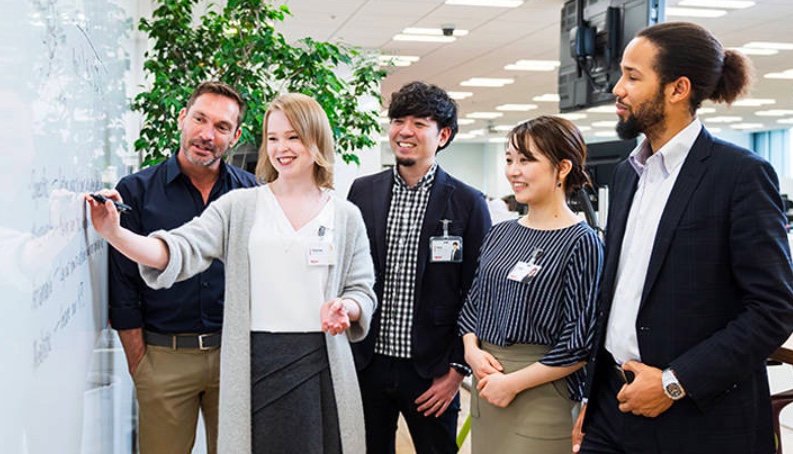As globalization accelerates, many people want to “put their love of English to work” or “acquire English language skills on their workplace,” and many companies want to “develop human resources who can also work overseas”.
Around 2010, companies started to adopt English as their official language. Many businesses adopted English as the company’s official language after Rakuten and Uniqlo made the announcement.
Rakuten Group,Inc.
Rakuten Group- a provider of mainly Internet-related services, is known for using English as its official internal language.
In February 2010, the company announced its policy to make English the official language of the company, and began the transition to English in July 2012.
The transition to English as the official language of the company was a very controversial move at the time, as it was the first time for a purely Japanese company to make English the official language of the company.
When the project began as a “Global Innovation Company,” the average TOEIC score for all employees was 526, but by 2015, the target score of 800 had been surpassed. Today, the company still requires a TOEIC score of 800 or higher as a condition for entry into the company for new employees.
ANA HOLDINGS INC.
All Nippon Airways Co. (ANA), a major airline, launched a three-year human resource development training program, the Global Talent Program, in 2011. The company has set TOEIC score targets for employees and is developing global leaders through global skill-up training for managers on a four-monthly basis.
In 2014, the company signed a partnership agreement with EF Education First, Inc. to provide language learning materials and online language training to employees in an effort to improve their global readiness.
FAST RETAILING CO.,LTD.
Fast Retailing- which owns the UNIQLO and GU clothing companies, also began using English as its official internal language in March 2012.
At the same time, Chairman and President Tadashi Yanai declared that the company will unify its executive salary structure on a global scale, make overseas transfers at the store manager level routine, and increase the number of foreign nationals in the hiring of new employees.
However, in the fifth year since the transition to English was made, there have been reports of problems like the use of Japanese by Japanese employees within the organization and variations in the penetration levels of various divisions.
Sharp Corporation
Sharp Corporation- a major electronics manufacturer, announced its policy to introduce English as an official internal language in 2010. Currently, English is used as an official language in some departments within the company, such as the R&D department.
The company’s acquisition agreement with Taiwan’s Hon Hai Precision Industry in 2016 has increased the importance of English language skills, and the company plans to eventually promote the use of English in all departments within the company.
Nippon Sheet Glass Company,Limited
Nippon Sheet Glass- one of the world’s leading glass manufacturers, is another well-known company where English is the official in-house language.
The company acquired Pilkington, a major glass manufacturing company in the U.K., in 2006 and has offices in 29 countries around the world. Although it is not clear whether the company has established guidelines for the use of English among Japanese people, 80% of its employees are non-Japanese, and English is used on a daily basis in the company.
Shiseido Company,Limited
Shiseido Co., Ltd, – one of the world’s leading cosmetics manufacturers, has adopted English as its official internal language since 2018.
The company provides an English learning environment at company expense for those who wish to study English, mainly employees at the head office. In 2018, approximately 3,000 employees participated in a program to improve their English skills. The company also offers company-funded study abroad programs (2-year full MBA / MOT) at business schools in Japan and abroad, as well as English camps.
Mercari,Inc.
Mercari Inc. has been actively hiring foreigners since 2017 and has employees from more than 40 different nationalities. In addition, as of August 2019, approximately 40% of the engineering organization in the Tokyo office is comprised of non-Japanese employees. However, Mercari does not dare to establish an official internal language, and English and Japanese are used interchangeably depending on the situation.
The company promotes English and Japanese language education as needed, and conducts training and workshops using the original curriculum of the Language Education Team, which specializes in language education for employees.
BRIDGESTONE CORPORATION
Bridgestone Corporation, a major tire manufacturer, announced in 2013 that it would make English the official language of the company.
The company operates in 150 countries around the world, and 80% of its employees are non-Japanese. English is used in communication with overseas offices and in executive management meetings.
SUMIDA CORPORATION
Sumida Corporation, an electrical equipment manufacturer, has been using English as a common language within the company since 2002. It is also important to note that one native English-speaking employee is assigned per floor at the head office.
Various other unique measures have been adopted in the company, such as a year-end party where employees are fined if they speak Japanese, an English speech contest (the winning prize is a trip to Guam), English nicknames for everyone, and 300,000 yen per year for English study expenses for those who wish to study English with a TOEIC score of 500 or higher.
In addition, foreign employees are employed in the company cafeteria, and all menus are written in English.
SONY GROUP CORPORATION
Sony Group Corporation, a general electronics manufacturer that is often called the original global company, has employees of various nationalities from 65 countries. Therefore, English is used as a common language for communication within the company.
Another feature of the company’s head office is the “Buddy Program,” an initiative started in 2013 in which Japanese employees and non-Japanese employees work as buddies and teach each other their native languages.
The company also includes a certain level of English proficiency as a requirement for promotion to managerial and higher positions.




Comments